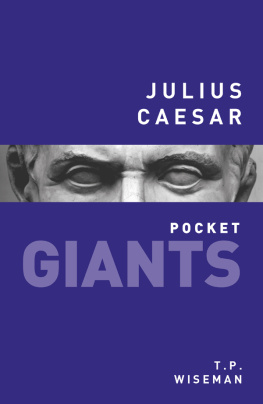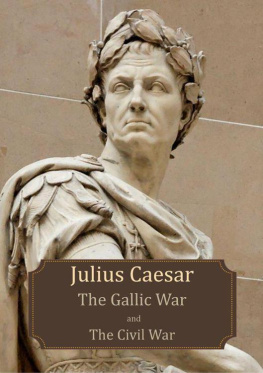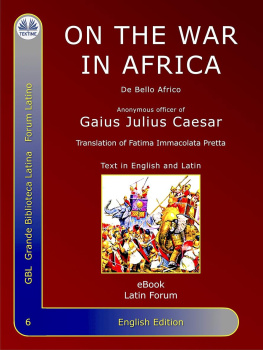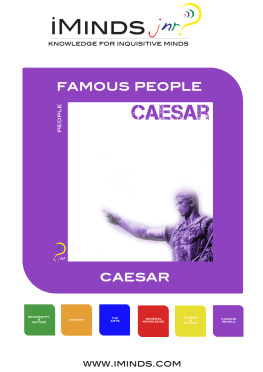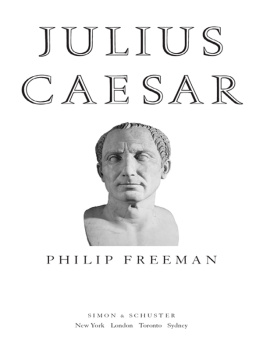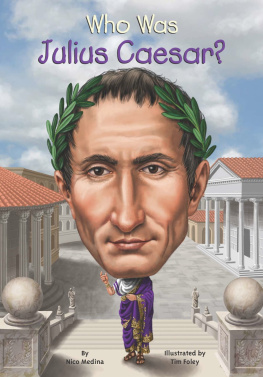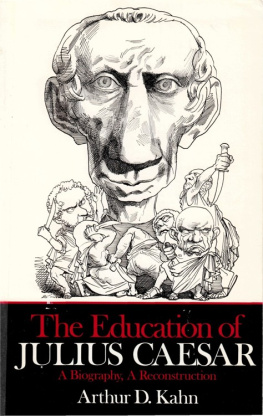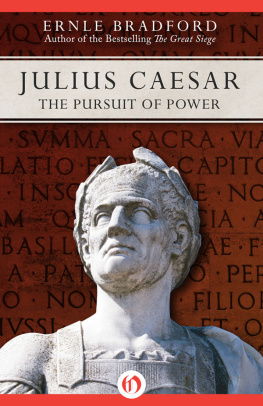Julius Caesar - Julius Caesar
Here you can read online Julius Caesar - Julius Caesar full text of the book (entire story) in english for free. Download pdf and epub, get meaning, cover and reviews about this ebook. City: Rom, year: 2016, publisher: The History Press, genre: Politics. Description of the work, (preface) as well as reviews are available. Best literature library LitArk.com created for fans of good reading and offers a wide selection of genres:
Romance novel
Science fiction
Adventure
Detective
Science
History
Home and family
Prose
Art
Politics
Computer
Non-fiction
Religion
Business
Children
Humor
Choose a favorite category and find really read worthwhile books. Enjoy immersion in the world of imagination, feel the emotions of the characters or learn something new for yourself, make an fascinating discovery.
- Book:Julius Caesar
- Author:
- Publisher:The History Press
- Genre:
- Year:2016
- City:Rom
- Rating:5 / 5
- Favourites:Add to favourites
- Your mark:
- 100
- 1
- 2
- 3
- 4
- 5
Julius Caesar: summary, description and annotation
We offer to read an annotation, description, summary or preface (depends on what the author of the book "Julius Caesar" wrote himself). If you haven't found the necessary information about the book — write in the comments, we will try to find it.
Julius Caesar — read online for free the complete book (whole text) full work
Below is the text of the book, divided by pages. System saving the place of the last page read, allows you to conveniently read the book "Julius Caesar" online for free, without having to search again every time where you left off. Put a bookmark, and you can go to the page where you finished reading at any time.
Font size:
Interval:
Bookmark:
Why is Julius Caesar a pocket GIANT?
Because he was one of historys great military commanders.
Because he freed Rome from a corrupt oligarchy.
Because he helped create the Roman Empire.
Because he gave his name to the worlds most famous dynasty.
T.P. WISEMAN FBA was for many years Professor of Classics at the University of Exeter. He has written widely on Roman history and literature, including (with his wife Anne) a translation of Caesars Gallic War commentaries.

First published in 2016
The History Press
The Mill, Brimscombe Port
Stroud, Gloucestershire, GL5 2QG
www.thehistorypress.co.uk
This ebook edition first published in 2016
All rights reserved
T.P. Wiseman, 2016
The right of T.P. Wiseman to be identified as the Author of this work has been asserted in accordance with the Copyright, Designs and Patents Act 1988.
This ebook is copyright material and must not be copied, reproduced, transferred, distributed, leased, licensed or publicly performed or used in any way except as specifically permitted in writing by the publishers, as allowed under the terms and conditions under which it was purchased or as strictly permitted by applicable copyright law. Any unauthorised distribution or use of this text may be a direct infringement of the authors and publishers rights, and those responsible may be liable in law accordingly.
epub isbn 978 0 7509 6967 3
Original typesetting by The History Press
eBook converted by Geethik Technologies
They are barbarians, but their system of government is admirable.
Eratosthenes of Cyrene (c. 285194 BC),
Greek philosopher and polymath
Imagine a democratic state based on the rule of law. Citizens have equal rights, and contribute to the common wealth according to their means. Private extravagance is frowned upon, and legal safeguards protect the weak from the abuse of power. Now imagine a huge influx of wealth in the space of a single generation. Unprecedented economic inequalities follow. The rich get richer and come to believe that their interests and privileges are what the state exists to protect. Public assets are privatised, with legal safeguards and regulations ignored or evaded. Social tensions become acute. The old ideals of consensus and co-operation seem helpless against the greed and luxury of a powerful few.
That was the state of the Roman Republic when Gaius Julius Caesar was born in what we call 100 BC.
The Romans had been equals from the very beginning. They believed that Romulus, the founder of the city, had divided what little territory he then commanded into equal lots, and thus created maximum equality for all alike. As the years went by there was no shortage of that.
Romulus did not found a dynasty. His successors, like him, were chosen by election and ruled by popular consent until the seventh in the sequence, Tarquin the Arrogant, seized power by murdering his predecessor and dominated the Romans by armed force. This exception proved the rule: Tarquin and his clan were driven out of the city by a popular rising in 507 BC. The leader of the liberation movement was called Lucius Brutus.
Because of Tarquin, the Romans swore they would never have another king. What they put in place was defined as annual magistracies, and obedience not to men but to the laws. We call it the Roman Republic, borrowing the Latin phrase res publica (originally res populica), which meant the Peoples thing. But no sooner had one form of corrupt rule ended than another began.
By 500 BC Rome had become a prosperous city state but her egalitarian ethos was under threat. Some families now defined themselves as patricians, meaning roughly those who know who their fathers were, and this self-appointed aristocracy of birth claimed a monopoly on public office. Patrician magistrates failed to protect plebeians (as the rest were now known) from exploitation and even enslavement by patrician landlords and creditors. The plebeians response was to elect their own representatives, known as tribunes, who would protect individuals and veto any measure they considered abusive. The persons of the plebeian tribunes were declared sacrosanct: anyone offering violence to them would be regarded as an offender against the gods and therefore subject to summary execution.
A long stand-off followed, until in 367 BC the patricians political monopoly was ended in a power-sharing agreement. Greek observers were enormously impressed by the fact that it had been achieved without bloodshed. As one of them put it much later:
The People of Rome and the Senate were often in conflict with each other, both about legislation and about debt-cancellation, land-distribution or elections. But there was no civil violence, only lawful differences and arguments, and even those they settled honourably by making mutual concessions.
What mattered was equal freedom for all, and the achievement of it was what made the Roman Empire possible.
Within four generations of the power-sharing deal, the Romans controlled, by conquest or treaty, the whole of Italy south of the Apennines. Throughout the peninsula, good farming land was divided up into equal lots for Roman settlers. Seven iugera (about 1.7 hectares) was the standard size, and, as one commander put it, wanting more than everyone else got was the sign of a bad citizen.
Three generations later, after two long and terrible wars with Carthage, the Romans controlled the whole western Mediterranean. In the second war they had been up against Hannibal, second only to Alexander the Great as a military genius. The two commanders who did most to defeat him (Fabius and Scipio) were both patricians; but the plebeian historian of those great events made a point of not naming the commanders. It was the Peoples achievement and when Scipio, as consul in 194 BC, instituted privileged seats for senators at the theatre games, it was regarded as an infringement of equal freedom:
For 557 years [since the foundation of the city] the games have been watched by all together. What has suddenly happened to make senators not want to have plebeians among them in the auditorium? Why should a rich man object to a poor man sitting next to him? Its just a new and arrogant self-indulgence.
The Romans still thought of themselves as a community of equals and now they were challenging kings. The great powers of the eastern Mediterranean were the dynastic monarchies that succeeded Alexanders short-lived empire: the Antigonids of Macedon, the Ptolemies of Egypt, the Seleucids of Syria, the Attalids of Pergamum. The first to fall was the oldest, Macedon.
The defeat and capture by the Romans of King Perseus, ninth in succession from Alexander himself, at the Battle of Pydna in 168 BC, was a truly epoch-making event. One indirect result of it was the presence in Rome of the Greek historian Polybius, who spent his years of exile writing a history to explain to his fellow countrymen:
by what means, and under what system of government, the Romans succeeded in less than 53 years [220167 BC] in bringing under their rule almost the whole of the inhabited world, an achievement without parallel in human history.
The system of government was the key to understanding, and Polybius devoted a whole volume to describing the Roman republican constitution. Its excellence was demonstrated, he thought, by the citizens moral behaviour: they acted in concord for the public good; they sacrificed their own interests to the welfare of the community; in office, they kept their oaths and were scrupulous with public funds.
Font size:
Interval:
Bookmark:
Similar books «Julius Caesar»
Look at similar books to Julius Caesar. We have selected literature similar in name and meaning in the hope of providing readers with more options to find new, interesting, not yet read works.
Discussion, reviews of the book Julius Caesar and just readers' own opinions. Leave your comments, write what you think about the work, its meaning or the main characters. Specify what exactly you liked and what you didn't like, and why you think so.

